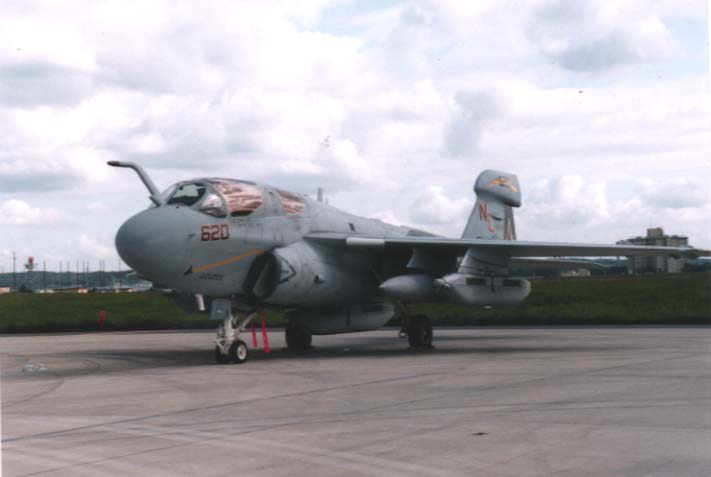By NICHOLAS D. KRISTOF
뉴욕타임스 인터넷판 원문 칼럼을 요약하자면 다음과 같다.
'미국이 지금 선제공격까지 생각하고 있다. 외교 수단이 실패할 경우에만 선제공격이 고려된다고 하지만, 부시행정부는 외교적인 수단을 쓸 생각이 별로 없다. 따라서 전쟁의 위험은 매우 크다고 생각된다. 한국과 일본 등 전쟁으로 피해를 볼 나라들은 전쟁의 위험을 크게 받아들이지 않고 있는데, 이는 이 두 나라가 부시행정부가 얼마나 정신나갔는지(crazy) 모르기 때문이다. 부시 행정부는 당장 북한과의 단독협상에 나서야 할 것이다.'
<뉴욕타임스> 칼럼 원문
Some of the most secret and scariest work under way in the Pentagon these days is the planning for a possible military strike against nuclear sites in North Korea.
 |
|
자국 잠수함에서의 미사일 발사를 유도하는 E6B기 |
Officials say that so far these are no more than contingency plans. They cover a range of military options from surgical cruise missile strikes to sledgehammer bombing, and there is even talk of using tactical nuclear weapons to neutralize hardened artillery positions aimed at Seoul, the South Korean capital.
There's nothing wrong with planning, or with brandishing a stick to get Kim Jong Il's attention. But several factions in the administration are serious about a military strike if diplomacy fails, and since the White House is unwilling to try diplomacy in any meaningful way, it probably will fail. The upshot is a growing possibility that President Bush could reluctantly order such a strike this summer, risking another Korean war.
The sources of information for this column will be as mystifying as the underlying U.S. policy itself, for few will discuss these issues on the record. But it seems those interested in the military option ?consisting primarily of raptors clustered around Dick Cheney and Don Rumsfeld and in the National Security Council ?have until recently been slapped down by President Bush himself.
Recently Mr. Bush seems to have become more hawkish. He is said to have been furious when Deputy Secretary of State Richard Armitage (one of the few senior Bush aides who know anything about Korea) told Congress that the U.S. would have to talk to North Korea.
So the White House has hardened its position further, swatting away its old willingness to engage North Korea bilaterally within a multilateral setting. Now the administration has dropped the bilateral reference and is willing to talk to North Korea only in a multilateral framework that doesn't exist. The old approach had a snowball's chance in purgatory; now it's less than that.
"We haven't exhausted diplomacy," one senior player noted. "We haven't begun diplomacy. . . . We could have a slippery slope to a Korean war. I don't think that's too alarmist at all."
Other experts I respect are less worried. James Lilley, an old Korea hand and former ambassador to Seoul and Beijing, says my concerns are "much too alarmist." He says the State Department controls Korea policy and realizes that "the military option is almost nonexistent."
Maybe. But meanwhile, North Korea is cranking out provocations and plutonium. This week it started up a small reactor in Yongbyon. More worrying, America's spooks detected on-and-off activity at a steam plant at Yongbyon, which may mean that the North is preparing to start up a neighboring reprocessing plant capable of turning out enough plutonium for five nuclear weapons by summer. Look for reprocessing to begin soon, perhaps the day bombs first fall on Iraq.
Dick Cheney and his camp worry, not unreasonably, that the greatest risk of all would be to allow North Korea to churn out nuclear warheads like hotcakes off a griddle. In a few years North Korea will be able to produce about 60 nuclear weapons annually, and fissile material is so compact that it could easily be sold and smuggled to Iraq, Iran, Libya, Syria and Al Qaeda.
The hawk faction believes that the U.S. as a last resort could make a surgical strike, even without South Korean consent, and that Kim Jong Il would not commit suicide by retaliating. The hawks may well be right.
Then again, they may be wrong. And if they're wrong, it would be quit a mistake.
The North has 13,000 artillery pieces and could fire some 400,000 shells in the first hour of an attack, many with sarin and anthrax, on the 21 million people in the "kill box" ?as some in the U.S. military describe the Seoul metropolitan area. The Pentagon has calculated that another Korean war could kill a million people.
So if the military option is too scary to contemplate, and if allowing North Korea to proliferate is absolutely unacceptable, what's left? Precisely the option that every country in the region is pressing on us: negotiating with North Korea.
Ironically, the gravity of the situation isn't yet fully understood in either South Korea or Japan, partly because they do not think this administration would be crazy enough to consider a military strike against North Korea. They're wrong.
출처 : 오마이뉴스 2003-03-01
'실시간 지구촌 개벽소식 > 5선위기의 한반도' 카테고리의 다른 글
| "北核문제 외교적 해결 회의적" (0) | 2008.03.19 |
|---|---|
| 부시 "북한에 다자간 압력 넣겠다" (0) | 2008.03.19 |
| "미국, 북한 영변 핵시설 폭격 검토" (0) | 2008.03.19 |
| 北 침투징후시 특수부대 선제 공격 (0) | 2008.03.19 |
| 北전투기 서해NLL 침범…20년만에 처음 (0) | 2008.03.19 |